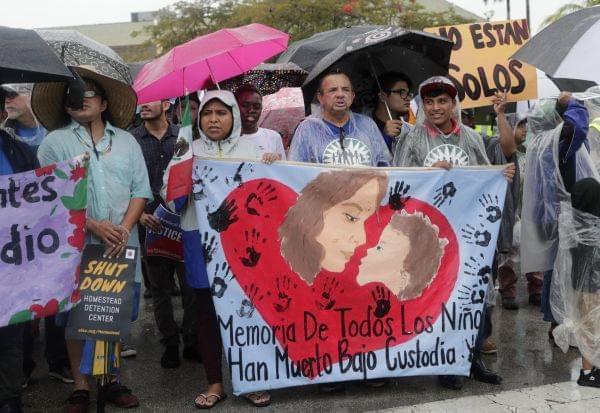How The Delayed ICE Raids Are Affecting Illinois; Scooter And Bike Sharing

Protesters carry a sign which reads "In memory of children who have died in custody" as they march outside of the Homestead Temporary Shelter for Unaccompanied Children, Sunday, June 16, 2019, in Homestead, Fla. AP Photo/Lynne Sladky
Last week, the President announced deportation raids across the country. But then he said he’d wait for two weeks. We check in with immigrant rights groups here in Illinois about how they’ve been handling all of this news. Plus, last year riders took nearly 40 million trips on electric scooters. Now Chicago has launched a pilot program on the city’s west side.
On Monday, June 17, President Trump tweeted that Immigration and Customs Enforcement (ICE) was slated to carry out deportation raids focused on ten cities, including Chicago. Then on Saturday, Trump said he’d delay the raids by two weeks. He also said the deportations would start unless Democrats changed the U.S. asylum laws.
We speak with Rep. Jan Schakowsky, a Democrat from Illinois’ 9th district, which includes parts of Chicago’s north side and north and northwest suburbs.
Much of the conversation around immigrant raids has focused on the big cities like Chicago where those raids were supposed to have taken place. But communities all across Illinois have felt the impact of the president’s comments on possible raids.
To check in on places outside of Chicago, we're joined by Ricardo Diaz, a board member of the New American Welcome Center and a founding member of CU Immigration Forum. We also talk to Sara Dady, an immigration attorney at her Rockford law firm, Dady Law Group, and Fred Tsao, policy director for the Illinois Coalition for Immigrant and Refugee Rights in Chicago.
"It's really hard to live everyday thinking that you're going to be separated from your family... that you have no rights and that no one can help you. And that's really how undocumented people live," says Sara Dady, Rockford based immigration attorney.
— The 21st (@21stShow) June 25, 2019
Plus--
Hundreds of cities across the country have been experimenting with a new transportation option: electric scooters. If you’ve traveled to a city like Washington D.C. or Los Angeles recently, you may have seen them on sidewalks and roads. Often you just need a smartphone app to rent them.
This is on top of the many cities that have dockless bike options, like Champaign and Chicago. Rockford also had a bike share program for about a year. And now, the city of Chicago just launched its own pilot program of e-scooters this month in parts of the west side. There were about 11,000 rides in the first weekend alone.
These options, especially scooters, have gotten some strong reactions. In Chicago's case, you don’t need to look much farther than two dueling Twitter accounts - one is called Chicago Scooter Fails and another is called Chicago Scooters Are Fine.
To learn more about how shared scooters and bikes fit into our transportation system, we hear from Kate Lowe, assistant professor at UIC’s Department of Urban Planning and Policy, and Andrew Small, a freelance reporter and author of the CityLab Daily newsletter. We're also joined by Sydney Turner, metro program manager for Region 1 Planning Council, which provides city planning for Ogle, Boone, and Winnebago counties.
.@kateontransport says scooters have mostly replaced walking trips. "For many, it's just adding redundancy to a system and not improving environmental conditions," she says.
— The 21st (@21stShow) June 25, 2019
Read more on scooters in Chicago here: https://t.co/d2KpyDPSZR

